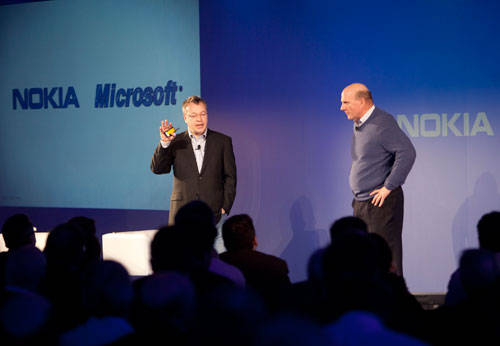Symbian doomed by Nokia-Microsoft deal

Turns out I was right about Nokia adopting Microsoft's Windows Phone 7 operating system, and right about some of the reasons. However, I was wrong about Symbian. Nokia's chief executive Stephen Elop is splitting the company to have separate divisions for Mobile Phones and Smart Devices, each with its own profit-and-loss responsibility. Putting Symbian into Smart Devices (and not, as I'd expected, Mobile Phones) means that Symbian will be phased out. However, MeeGo has been reprieved as an insurance policy.
This is not to say that Symbian will soon be discontinued, and Nokia expects to sell another 150 million Symbian phones. In fact, at meetings with press and analysts held in London this morning, Elop said there would be "fresh new innovation in Symbian," and new handsets, depending on "the rate at which Windows Phone 7 comes down the price continuum."
However, the word "harvest" cropped up a few times. The plan involves slashing Symbian R&D to as close to zero as possible, and raking in the money from the installed base of about 1.3bn Symbian phone users. In a perfect world, the decline in Symbian sales would be slightly slower than the growth in WP7 sales. Much of the previous R&D budget would therefore turn into profit, since most of the software R&D will now be done by Microsoft.
As for Qt, Elop said: "We are not proposing a 'put Qt on Windows Phone' strategy." This met with some ire when Nokia posted its Letter to Developers about Today’s News. But it's not being killed off. Qt will continue on the MeeGo platform, which Nokia will use to try to create the next "disruptive" system.
 Stephen Elop from Nokia and Steve Ballmer from Microsoft on stage in London
Stephen Elop from Nokia and Steve Ballmer from Microsoft on stage in London
Nokia's Mobile Phones division will also continue with the low-end mobiles and cheap feature phones that make up about half its business. This division's task will be to get the next billion users online, mostly via proxy server systems.
Elop has, as expected, negotiated a sweetheart deal with Microsoft. It will pay royalties for WP7, but Microsoft will kick back "substantial" sums in "sales and marketing support". Nokia will also have a "substantial influence on the future of Windows Mobile phone". This will ensure support for Nokia technologies, and enable it to provide "differentiation". As Elop said, "this is not your mother's OEM deal with Microsoft".
So, why WP7 instead of Android? Previously, I'd argued that adopting Android would put it behind its biggest rival. This is not Apple or RIM but Samsung. (On Gartner's numbers, Nokia shifted 461.3 million phones in 2010. Samsung was in second place, selling 281.1m phones.) Nokia would be a late starter in Android, whereas Samsung already has a lot of software expertise, hardware manufacturing skills, operator relationships and customer mindshare.
Elop also came up with other reasons why Microsoft was a better fit. Nokia would have never got any sort of joint development out of Google, and it would never have got the support for Ovi, Navteq and other properties that Nokia is getting with this deal. Microsoft may sometimes do partnerships badly, but more than 90% of its revenues come via partners. Google doesn't really do partnerships at all.
Then there's the American market, where Nokia is particularly weak and Microsoft is relatively strong, and vice versa. Elop said: "It gives them a faster path to global markets. It will give us a faster path to the US market."
On paper, then, Nokia and Microsoft look like a good fit. Microsoft gets the one and only phone giant willing to put Windows Phone 7 first -- which isn't true of Samsung, LG or, now, HTC. Nokia gets a preferential and (presumably) profitable deal for an advanced operating system, plus co-operation that it could never have got from Google.
Whether it will work or not remains to be seen, because as Elop said: "no one can override the consumer."
But even if the project fails, Nokia deserves some credit for its courage. As Elop said: "Google was a valid option but that felt a little bit too much like giving up and not enough like fighting back." Nokia, Microsoft and most mobile network operators are not yet ready to see the phone market split between only two major players, Apple and Google.
Press releases
Nokia: Nokia outlines new strategy, introduces new leadership, operational structure